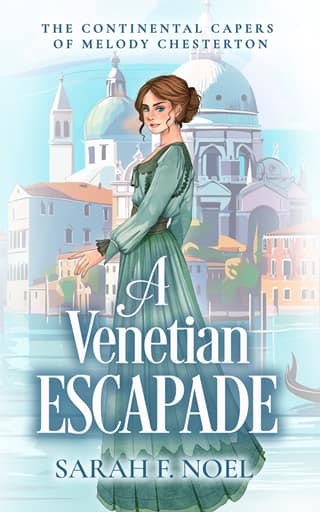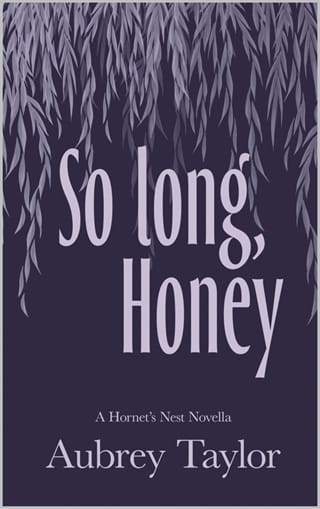Chapter 9
I spettore Paolo Moretti was exhausted, something he seemed to be a lot these days. His wife had recently given birth to their fifth child, a girl, and the baby kept them up most nights. They shared a house near the university, Ca' Foscari, with his wife's family. While Paolo had been grateful to his father-in-law for the offer when he was first starting out in the Regia Guardia di Pubblica Sicurezza as a guardia, now, all he could focus on was how overcrowded and noisy the house had become.
Paolo had suggested to his wife, Gianna, quite a few times that it might be time to move out of her family's house, but each time, the conversation had ended with recriminations and tears. So, for now, he was resigned to sleepless nights and days without the possibility of even a moment of peace and solitude. In fact, he looked forward to going to the Questura in the mornings; at least he could get some time alone in his small, cramped, windowless office.
The gondolier had reported the murder at the Questura and demanded that an inspector be dispatched immediately. The standard protocol would be for lower-ranking members of the police force to be the first at a crime scene, with the inspector coming once the scene had been secured. However, once the gondolier mentioned his employer, the infamous Marchesa Luisa Casati, Ispettore Moretti realised that he needed to take charge of the situation personally.
Moretti had heard the tales of the marchesa and her cheetah, outrageous outfits and decadent parties. He was a simple man who led a simple life; he provided for his family and kept his city safe, and if he secretly aspired to promotion to commissario, he was nevertheless clear-eyed enough to keep his ambition in check. Of average height, weight, looks, and abilities, Moretti nevertheless was comfortable with who he was and his status in life and could not understand those who felt the need to turn their life into a public performance. He wasn't sure he had the energy that morning to deal with a murder and a notorious aristocrat.
Turning to the sergeant, Sovrintendente Vinditti, he had brought along, Moretti asked, "Did the gondolier tell you anything more than that there had been a murder?"
Murders were not particularly common in Venice. Unlike the south of Italy, where organised crime in the form of the Cosa Nostra and Camorra made murder prevalent, Venetians tended to contain their criminal activities to smuggling and pickpocketing.
Vinditti shook his head, "It seemed that he didn't know much more than that. His mistress came out to the gondola in a panic, and all she said was that he was to fetch the police and tell them that a man had been murdered in the bookshop."
Moretti walked home past the bookshop every day. He wasn't much of a reader and so had never had cause to go in, but he knew the owner, Antonio Graziano, by sight in the way that so many Venetians knew their fellow citizens. The last time he had seen the old man, he had been shutting up the shop for the day. They had exchanged friendly "good evenings", "Bono sera" in the Venetian dialect that was so natural when Venetians spoke to each other. Even though Venice had been part of a unified Italy since 1866, its people's dialect still helped set them proudly apart from the rest of the country.
At the time, Moretti had a passing thought that the elderly bookseller seemed particularly old and worn down. Now, he found himself hoping that whoever the murder victim was, it wasn't the kindly-looking Graziano.
It didn't take long to get to the shop from the Questura. It was a lovely early summer's day, and Moretti would have enjoyed the walk if he hadn't been on his way to view a dead body. Arriving at the shop, he and Vinditti found no one in the front so they walked through to the back. They followed the sound of voices into the office.
Like all Venetians, Moretti knew who Luisa Casati was. Crowds would often gather to watch as she paraded about the city with her cheetah and enormous, dark-skinned manservant. If he was surprised at her outlandish outfit that morning, he did his best not to let this show. Who was the pretty young woman with the marchesa? While Venetians were not as olive-skinned as their more southern brethren, there was something in the young woman's porcelain complexion and auburn hair that suggested she was not a local.
"Buongiorno," he said respectfully, dipping his head.
The pretty young woman was the first to come forward and said in English, "Thank you for coming."
Moretti's command of English was minimal. His confusion must have been apparent, for the marchesa said in Italian, "Thank you for coming so quickly. I am the Marchesa Luisa Casati, and this is Miss Melody Chesterton." Moretti introduced himself and Vinditti quickly.
As soon as he entered the office, Moretti realised with sadness that the dead man was Antonio Graziano. He asked the marchesa how they had happened to come across the victim, and she had given him a rather melodramatic response. It was clear that the young Englishwoman understood some Italian because she nodded along.
The basics of the story out of the way, the pretty young girl said something in English to the crazy marchesa, who said in Italian, "Miss Chesterton has a theory that she'd like me to translate. While she does speak some Italian, she is not comfortable enough to relay her thoughts."
With that, Melody, translated by Luisa, explained about the piece of gaberdine she had found caught on the window frame, her observations about the cigarette ash, and when Antonio Graziano must have been killed. As Luisa translated Melody's deductions about the likelihood that the victim had welcomed his killer into his office and sat talking with him, Moretti raised his eyebrows slightly but didn't interrupt. Compared to some of his colleagues in the Questura, his ego was contained. If this young woman had something to contribute that might help solve this murder, he was more than happy to listen to her thoughts. When the medico legale, Dottore Leone, arrived, he would confirm or deny her guess as to how recent the murder had been.
When Melody got to her hypothesis about why this hadn't been a robbery and pointed out the closed safe, Moretti nodded, increasingly impressed at the woman's intelligence and observations. She ended with her supposition that the murderer had heard them calling out to the bookseller and had escaped out of the window.
Moretti nodded again and said to Vinditti, "Make sure that your men walk the calle and see if anyone saw anything. A man climbing out of the window isn't an everyday occurrence, after all." Sovrintendente Vinditti wasn't as inclined as the ispettore to take the word of a slip of a girl, or indeed any female, but he knew enough just to nod his head in agreement. Moretti had been particularly short-tempered ever since the birth of the latest baby, and Vinditti had no desire to be on the receiving end of his boss's ire.
By the time Melody had got to the end of her conclusions, the medical examiner, Dottore Leone, had arrived with men who could remove the body. The white-haired medico legale probably should have handed the job over to a younger man many years before. However, Pasquale Leone had no wife or children. He lived alone with only a cat for company and couldn't imagine how he would fill his days without the work that had sustained him for more than forty years. His hearing and sight were not what they once were, but his intellect was as sharp as ever, and so no one was inclined to force the issue of retirement with him.
Unlike Moretti, Dottore Leone spoke excellent English, and once it became clear that Melody's Italian was insufficient, the medical examiner happily switched languages.
Melody explained that the body was still warm to the touch when they discovered it, which couldn't have been more than thirty minutes before.
"Sì," Dottore Leone agreed, "La rigidità cadaverica, in English you say, rigor mortis, it has not set in at all yet. In the warmer weather we are having now, I would expect it to start in one to two hours. If you found him half an hour ago, I think it is very likely that the murder was not much before that."
Melody was gratified to have her conclusions validated, and she appreciated that neither the police inspector nor the elderly medical examiner condescended to her but instead took her observations seriously. The other policeman, the more junior one, had a bit of a sour look on his face, but Melody was more than used to men discounting her intelligence. The only woman she had ever known who immediately commanded the respect of men of any rank was Granny, who, even in her advanced years, would never stand for anything less than total deference.
Despite the men's willingness to consider her theories, it was clear that her continued presence would not be tolerated. Melody didn't need Luisa to translate to understand that the inspector was thanking them for their help and inviting them to leave. Luisa told him only where Melody was staying; most of Venice knew where the marchesa could be found.
It had been evident that her friend's death had very much shaken Luisa, but once they were back in her gondola and making their way back to the Grand Canal, she began to recover her composure.
"Melody, I would not have known what to do if you had not been with me," Luisa confessed.
Melody guessed that her friend must have been in her late twenties, perhaps even thirty, and yet, despite her bizarre outfits and lifestyle, in many ways, she had an almost childish naivety about her. There was so much about her appearance that was artifice; even her pupils seemed abnormally large as if she used something to dilate them. And yes, despite the performative nature of so much in her life, Luisa seemed to have a fragility about her that intrigued the self-assured Melody Chesterton.
"I am having a party tomorrow night." It seemed not to occur to Luisa that continuing with her planned festivities, having just discovered a so-called friend murdered, might be in poor taste. Instead, she became more animated just at the thought of her soiree. "You must attend, sì? And, of course, bring your brother."
Melody was delighted to receive the invitation, but she wasn't sure what Rat would think about accompanying her. She knew that he took his role as her guardian during this trip very seriously and was as concerned for her moral well-being as he was for her physical. The previous evening, she had sensed his apprehensiveness when the plan was formed to visit the bookshop with the intriguing marchesa. She could only imagine how much more concerned he would be about his sister attending one of her notorious parties. Nevertheless, Melody was determined to attend, one way or another, and eagerly accepted the invitation.
As excited as she was, even Melody was somewhat taken aback by her new friend's next statement, "My parties, they always have the themes. Tomorrow night we will be ancient gods and goddesses. I will be Aphrodite!"
Melody had never been to a masquerade ball, and the thought of attending one thrown by the outlandish Marchesa Casati was thrilling, except that she and Rat didn't have any costumes to wear. With not much more than twenty-four hours until the party, she couldn't imagine how they would acquire some.
Intuiting her young friend's dilemma, Luisa said, "I have a dressmaker who is dedicated to my costumes. I will have her come to Lady Bainbridge's palazzo this afternoon, and it is Luisa's promise that she will have costumes ready before the party."
Of course, Melody thought, this still didn't resolve the issue of how she would persuade Rat to let her attend. He would never countenance the thought of her attending alone, but now that she knew it was to be a costume party, it seemed even less likely that her strait-laced brother would agree to escort her.
 Fullepub
Fullepub 



